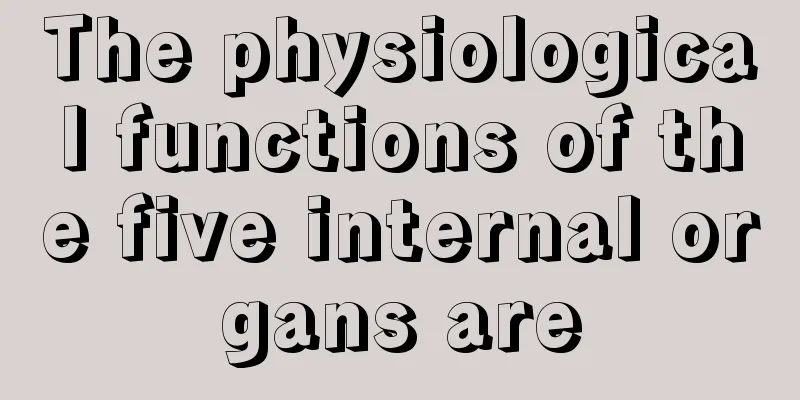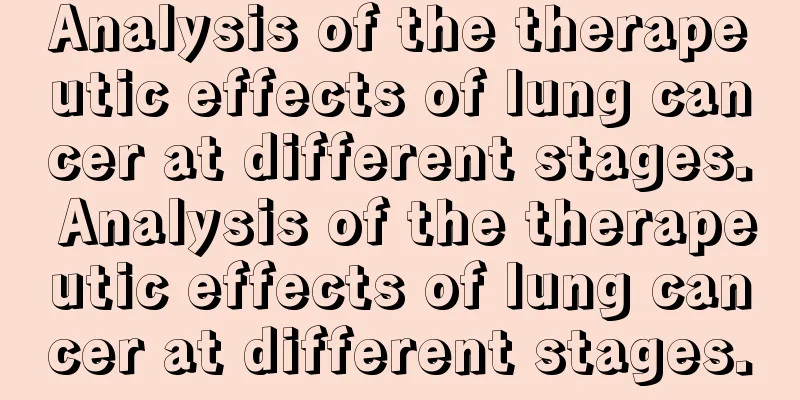The physiological functions of the five internal organs are

|
The reason why people can survive well is closely related to the five internal organs. If there is a problem with a person's five internal organs, it will directly endanger his life and make his body unable to live normally. Treatment is needed. Therefore, you must take good care of your five internal organs so that the detoxification system, digestive system and other systems can function normally and your body will not accumulate too many toxins. (1) The integrity of the human body centered on the five internal organs The Zang-Xiang theory believes that the human body is an extremely complex organic whole. The various components of the human body are inseparable in structure, mutually beneficial in function, interconnected in metabolism, and influence each other pathologically. The Zang-Fu theory is centered on the five internal organs, and connects the six internal organs, five limbs, five senses, nine orifices, limbs and bones, and other organs, bodies into an organic whole through the meridian system "internal to the internal organs and external to the limbs". The five internal organs represent the five physiological systems of the human body. All tissues and organs of the human body can be included in these five systems. Its specific connected system structures are: liver system (liver - gallbladder - tendons - eyes - claws), heart system (heart - small intestine - veins - tongue - face), spleen system (spleen - stomach - meat - mouth - lips), lung system (lung - large intestine - skin - nose - hair), kidney system (kidney - bladder - bone marrow - ears - hair). These five systems are not isolated from each other, but are interconnected through the communication of meridians and the flow of Qi and blood. The coordinated and mutual functions of the five internal organs are an important guarantee for maintaining the physiological balance of the human body. Traditional Chinese medicine uses the Yin-Yang theory to explain the dynamic equilibrium relationship between the Yin and Yang of the five internal organs, which are both mutually restraining and mutually dependent, and uses the Five Elements theory to explain the coordinated and unified relationship between the functions of the five internal organs, which are both mutually supportive and mutually restraining. Among the five internal organs, the heart is the most dominant one and is the master of all the five internal organs. After the Ming Dynasty, the theory of Mingmen flourished, and people had a deeper understanding of the functions of kidney essence, kidney qi, kidney yin and kidney yang, and there was also a saying that "kidney is the basis of yin and yang of all organs." In addition, the physiological activities of the five internal organs are closely related to mental emotions. The theory of Zang-Fu organs in traditional Chinese medicine believes that human mental activities are a reflection of the body's overall vital functions and are closely related to the normal physiological functions of the five internal organs. Human mental activities are generated and nourished by the essence of the five internal organs. For example, "Lingshu·Ben Shen" says: "The liver stores blood, and blood houses the soul... The spleen stores nourishment, and nourishment houses intention... The heart stores pulses, and pulses house the spirit... The lungs store qi, and qi houses the soul... The kidneys store essence, and essence houses the will." Therefore, "Su Wen·Xuan Ming Wu Qi" divides mental consciousness and thinking activities into the five internal organs: "The heart stores the spirit, the lungs store the soul, the liver stores the soul, the spleen stores intention, and the kidneys store will." Emotional activities are originally generated by the essence of the five internal organs. "Su Wen·Yin Yang Ying Xiang Da Lun" says: "Humans have five internal organs that transform five qi to give rise to joy, anger, sorrow, worry, and fear." Therefore, emotional activities are controlled by the five internal organs respectively, such as "the heart is responsible for joy", "the liver is responsible for anger", "the spleen is responsible for thinking", "the lungs are responsible for worry", and "the kidneys are responsible for fear". However, excessive emotions can damage the essence of the five internal organs, such as "anger hurts the liver", "joy hurts the heart", "thinking hurts the spleen", "worry hurts the lungs", and "fear hurts the kidneys" (Su Wen: The Great Treatise on the Correspondence of Yin and Yang). |
<<: What diseases are chronic diseases
>>: What are the physiological functions of the liver
Recommend
How to cleanse and detoxify the body
Nowadays, it is also an era of gourmet food. Peop...
Can I take medicine the day before a physical examination?
With the continuous improvement of daily living s...
What is the difference between yang deficiency and yin deficiency
Kidney deficiency has always been a disease that ...
Learn 5 ways to make your hair thicker
If you want to make your hair thicker, you need t...
Can the tongue grow longer the day after tomorrow
Everyone knows that the tongue not only helps us ...
What to do if you have heavy facial hair
Although hair can grow on any part of the human b...
What is the TCM treatment method for breast cancer after surgery
What is the TCM treatment method after breast can...
What is the reason for hip pain
The hip bones are located on both sides of the th...
Is curly or straight hair suitable for a round face?
Nowadays, people particularly like oval faces. If...
How much do you know about blood problems?
The dangers of “unhealthy blood” 1. Low awareness...
What to do if your waist gets cold and you can't straighten it up
If you do not pay attention to the maintenance of...
Can applying a hot towel to the eyes remove dark circles? If you love beauty, you must know
In recent years, with the gradual increase in wor...
How to clean oil stains on cashmere sweaters?
Cashmere sweaters are one of people's favorit...
Tell you about the symptoms of esophageal cancer
Tumors can also occur in the esophagus, and esoph...
The efficacy of oyster shells
Seafood is very famous in coastal areas, and oyst...









